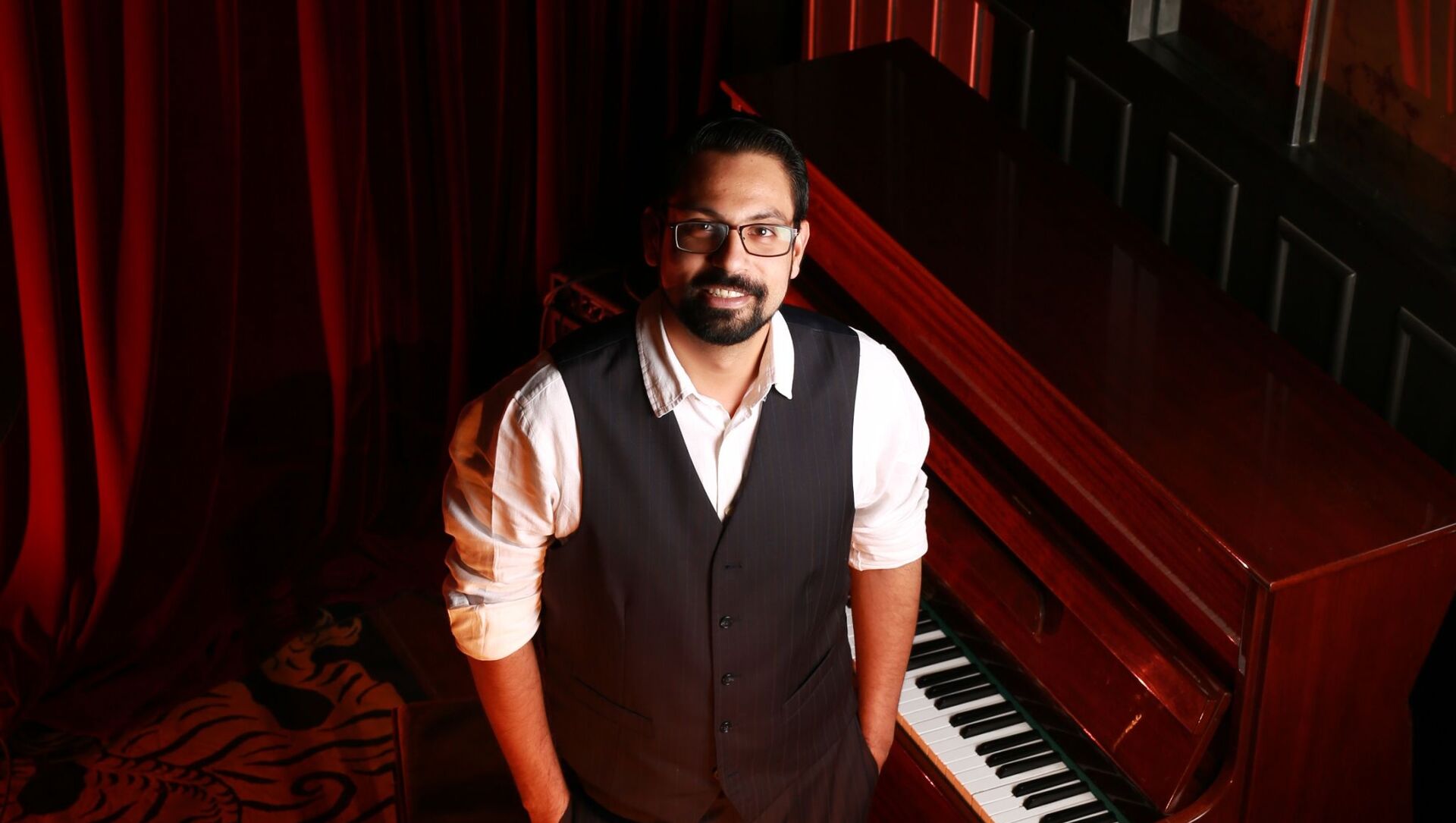https://sputnikglobe.com/20210709/time-to-reinvent-pianist-arjun-gupta-on-returning-to-live-jazz-gigs-in-post-lockdown-india-1083345869.html
‘Time To Reinvent’: Pianist Arjun Gupta On Returning to Live Jazz Gigs in Post Lockdown India
‘Time To Reinvent’: Pianist Arjun Gupta On Returning to Live Jazz Gigs in Post Lockdown India
Sputnik International
Jazz has gained in popularity in India with a sharp rise in singers and instrumentalists collaborating internationally and demand for jazz nights. However... 09.07.2021, Sputnik International
2021-07-09T16:19+0000
2021-07-09T16:19+0000
2022-07-19T10:37+0000
newsfeed
world
jazz
jazz
music
musician
pop music
music band
https://cdn1.img.sputnikglobe.com/img/07e5/07/09/1083346659_0:863:2048:2021_1920x0_80_0_0_a7c7fca7bed090a16e05c0d3e64a000c.jpg
From being a student of electronics engineering to studying music for almost two decades (as well as a little bit of architecture, baking, and becoming an accomplished pianist and restaurateur), Arjun Sagar Gupta has worn many hats and played a big role in boosting Jazz music in India.Founder of The Piano Man Jazz Club across India, Arjun came up with the concept of bringing art, music, culture, and mouth-watering culinary joys under one roof to which music lovers flock every evening to unwind and have a good time.Gupta talks to Sputnik about the booming jazz industry and culture in India and how a small community of jazz musicians is experimenting and keeping the art form going through live shows and more.Sputnik: How did the COVID-19 pandemic affect the live entertainment and hospitality industry?Arjun: After lifting the second lockdown, we reopened The Piano Man Jazz Club in Delhi and Gurugram cities allowed artists to perform live but with only 50 percent of the guests and staff. The pandemic has been a disaster for us from many perspectives. Some of our colleagues in the industry have shut their business and the ones that are still around are struggling. I wish the industry had received some support from the government as it has across the world because this industry is a big employment and revenue generator for the country, besides directly impacting the quality of life.The National Restaurants Association of India (NRAI) is working hard to bring some of the problems the industry is facing to the government's attention and is continually interacting with various agencies to find a solution.Sputnik: Tell us about the growing Jazz culture in India. Arjun: There is a fascinating book called “Taj Mahal Foxtrot” by Naresh Fernandez, which I'd recommend anyone interested in Jazz Music in India to read.Since the late Eighties, the Jazz Yatra - a three-day music festival - has played a leading role in increasing jazz's exposure. I've had the opportunity to work with them for many years.In the early 2000s, when I started playing on the scene, you could count the serious jazz musicians in the country on your fingers. Today, there is a small but thriving and growing community of jazz musicians and we are in the middle of that space where we get to interact with them. Sputnik: Do Indian Jazz musicians get their due recognition?However, exposure and opportunity have pushed the scene ahead. The community and culture will only exist and grow if there is continuous and dedicated exposure to it. Sputnik: What kind of new directions is jazz taking?Arjun: One that always comes to mind is a band called Jatayu which plays Carnatic jazz-rock fusion. They have a clear definition of what they want to do and the music is absolutely mesmerising. Experiments continue, each producing a sound that appeals to a different set of listeners. For example, combining Indian music with jazz is not easy, one needs to put in extensive research and study before blending the two cultures meaningfully.Sputnik: Why is Jazz still niche and not as popular as Bollywood Hindi, Punjabi, and classical Sufi music? Arjun: We have all grown up listening to Bollywood, Punjabi, and Sufi music and have had exposure and endless time to understand it and form a connection with the music. If a similar amount of effort and money were invested in promoting jazz, I can assure you, the art form wouldn't be niche anymore. It doesn't matter if you haven't heard the music before, or even if you speak the language of the songs - music has a way of connecting with you if you allow it to. If you don’t like it, it is okay; maybe come back another day and try something else. But if you're curious then stay and spend some more time listening.
Sputnik International
feedback@sputniknews.com
+74956456601
MIA „Rossiya Segodnya“
2021
Sangeeta Yadav
https://cdn1.img.sputnikglobe.com/img/07e4/08/1b/1080292803_0:121:960:1081_100x100_80_0_0_7490b319dab9611e309056b177265184.jpg
Sangeeta Yadav
https://cdn1.img.sputnikglobe.com/img/07e4/08/1b/1080292803_0:121:960:1081_100x100_80_0_0_7490b319dab9611e309056b177265184.jpg
News
en_EN
Sputnik International
feedback@sputniknews.com
+74956456601
MIA „Rossiya Segodnya“
Sputnik International
feedback@sputniknews.com
+74956456601
MIA „Rossiya Segodnya“
Sangeeta Yadav
https://cdn1.img.sputnikglobe.com/img/07e4/08/1b/1080292803_0:121:960:1081_100x100_80_0_0_7490b319dab9611e309056b177265184.jpg
newsfeed, jazz, jazz, music, musician, pop music, music band
newsfeed, jazz, jazz, music, musician, pop music, music band
‘Time To Reinvent’: Pianist Arjun Gupta On Returning to Live Jazz Gigs in Post Lockdown India
16:19 GMT 09.07.2021 (Updated: 10:37 GMT 19.07.2022) Jazz has gained in popularity in India with a sharp rise in singers and instrumentalists collaborating internationally and demand for jazz nights. However, because of the COVID-19 pandemic, the live entertainment scene faced a setback which led to musicians having to improvise to keep their music alive.
From being a student of electronics engineering to studying music for almost two decades (as well as a little bit of architecture, baking, and becoming an accomplished pianist and restaurateur), Arjun Sagar Gupta has worn many hats and played a big role in boosting Jazz music in India.
Founder of The Piano Man Jazz Club across India, Arjun came up with the concept of bringing art, music, culture, and mouth-watering culinary joys under one roof to which music lovers flock every evening to unwind and have a good time.
Gupta talks to Sputnik about the booming jazz industry and culture in India and how a small community of jazz musicians is experimenting and keeping the art form going through live shows and more.
Sputnik: How did the COVID-19 pandemic affect the live entertainment and hospitality industry?
Arjun: After lifting the second lockdown, we reopened The Piano Man Jazz Club in Delhi and Gurugram cities allowed artists to perform live but with only 50 percent of the guests and staff. The pandemic has been a disaster for us from many perspectives. Some of our colleagues in the industry have shut their business and the ones that are still around are struggling.
I wish the industry had received some support from the government as it has across the world because this industry is a big employment and revenue generator for the country, besides directly impacting the quality of life.
The National Restaurants Association of India (NRAI) is working hard to bring some of the problems the industry is facing to the government's attention and is continually interacting with various agencies to find a solution.
Sputnik: Tell us about the growing Jazz culture in India.
Arjun: There is a fascinating book called “Taj Mahal Foxtrot” by Naresh Fernandez, which I'd recommend anyone interested in Jazz Music in India to read.
India has had an impressive jazz heritage, with the likes of Duke Ellington having toured India and Chick Corea, who performed at The Piano Man.
Since the late Eighties, the Jazz Yatra - a three-day music festival - has played a leading role in increasing jazz's exposure. I've had the opportunity to work with them for many years.
In the early 2000s, when I started playing on the scene, you could count the serious jazz musicians in the country on your fingers. Today, there is a small but thriving and growing community of jazz musicians and we are in the middle of that space where we get to interact with them.
Sputnik: Do Indian Jazz musicians get their due recognition?
Arjun: We have a very small community of musicians playing jazz in India at the moment and they don’t have the recognition they deserve.
However, exposure and opportunity have pushed the scene ahead. The community and culture will only exist and grow if there is continuous and dedicated exposure to it.
Sputnik: What kind of new directions is jazz taking?
Arjun: One that always comes to mind is a band called Jatayu which plays Carnatic jazz-rock fusion. They have a clear definition of what they want to do and the music is absolutely mesmerising.
Experiments continue, each producing a sound that appeals to a different set of listeners. For example, combining Indian music with jazz is not easy, one needs to put in extensive research and study before blending the two cultures meaningfully.
An artist who led the way for microtonal music in jazz was David Fiuczinsky - leader of Screaming Headless Torsos and a member of Hasidic New Wave - who is just incredible. Rudresh Mahanthappa, a world-famous Indian-origin saxophone player, has been delighting the world with his musical storytelling for decades.
Sputnik: Why is Jazz still niche and not as popular as Bollywood Hindi, Punjabi, and classical Sufi music?
Arjun: We have all grown up listening to Bollywood, Punjabi, and Sufi music and have had exposure and endless time to understand it and form a connection with the music. If a similar amount of effort and money were invested in promoting jazz, I can assure you, the art form wouldn't be niche anymore.
It doesn't matter if you haven't heard the music before, or even if you speak the language of the songs - music has a way of connecting with you if you allow it to. If you don’t like it, it is okay; maybe come back another day and try something else. But if you're curious then stay and spend some more time listening.



